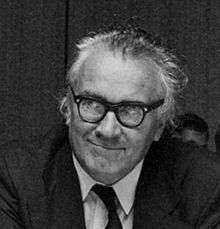Stein Rokkan
Stein Rokkan (July 4, 1921 – July 22, 1979) was a Norwegian political scientist and sociologist. He was a professor in comparative politics at the University of Bergen.
Stein Rokkan | |
|---|---|
 | |
| Born | July 4, 1921 |
| Died | July 22, 1979 (aged 58) Bergen, Norway |
| Occupation | Political scientist, sociologist |
Career and influence
Stein Rokkan was born on the Lofoten archipelago in the far north of Norway and raised in the nearby town of Narvik. Originally educated as a philosopher, Rokkan collaborated in the 1940s and 1950s as the assistant of Arne Næss. Later on, his interest turned towards the study of politics, especially the formation of political parties and European nation-states. It was during this period that he collaborated with Seymour Martin Lipset. He is also known as a pioneer of using computer technology in the social sciences. He wrote on cleavage, comparative history, party systems and Catalan nationalism, among other topics.
Rokkan is the creator of a series of models for state and nation formations in Europe. He was president of the International Political Science Association from 1970 to 1973, president of the International Social Science Council (ISSC), which was founded by UNESCO, from 1973 to 1977, vice-president of the International Sociological Association from 1966 to 1970, and chairman (from 1970 to 1976) and co-founder of the European Consortium for Political Research (ECPR).
Legacy
The Stein Rokkan Prize for Comparative Social Science Research has been awarded by the ISSC, the ECPR and the University of Bergen since 1981.[1]
The University of Bergen has a Stein Rokkan Centre for Social Studies[2] and a Stein Rokkan Building[3] at street address Nygårdsgaten 5.[4]
Selected works
- Numerisk demokrati og korporativ pluralisme: To beslutningskanaler i norsk politikk (Numerical Democracy and Corporate Pluralism: Two Decision Channels in Norwegian Politics, 1966). Selected for the Norwegian Sociology Canon in 2009–2011.
- Party Systems and Voter Alignments. Co-edited with Seymour Martin Lipset (Free Press, 1967)
- Citizens Elections Parties. Approaches to the Comparative Study of the Processes of Development (Universitetsforlaget, Oslo. 1970; reprinted in European Classics of Political Science Series, Colchester. 2009)
- Building States and Nations. Co-edited with Shmuel Eisenstadt (Sage, 1973)
- Economy, Territory, Identity: Politics of West European Peripheries. Co-authored with Derek W. Urwin (Sage, 1983)
Sources
- State Formation, Nation-Building, and Mass Politics in Europe: The Theory of Stein Rokkan. Edited by Peter Flora (Oxford University Press, 1999).
- Hans Daalder, 'Europe's comparatist from the Norwegian periphery. Stein Rokkan 1921-1979', in Idem (ed.), Comparative European Politics. The Story of a Profession, London: Pinter, 1997, pp 26–39).
References
- "Stein Rokkan Prize". ECPR Prizes and Awards. Retrieved 2016-05-15.
- "Stein Rokkan Centre For Social Studies". Uni Research. Retrieved 2016-05-15.
- "Stein Rokkans Hus". University of Bergen. Retrieved 2016-05-15.
- "Fire at Stein Rokkans hus". University of Bergen. 2016-04-19. Retrieved 2016-05-15.